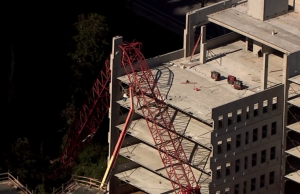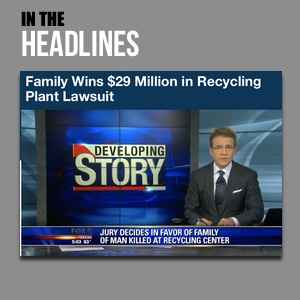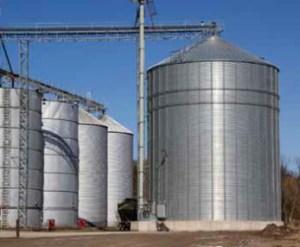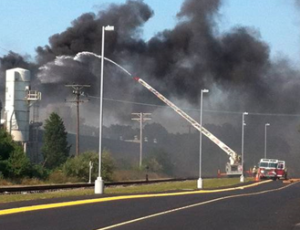
(WSBTV)
Georgia Crane Collapse
Firefighters reportedly rescued two construction workers during an Atlanta crane collapse Thursday afternoon, October 15, 2015.
According to WSBTV News, the construction accident occurred near Roxboro and Kingsboro Roads in Buckhead, as construction crews worked on a high-rise apartment building. The crane apparently hit a cherry picker as it fell and came to rest against the building. Media reports indicate at least two workers were rescued from the scene by a firetruck ladder.
Thankfully nobody was injured in this incident. However, the accident serves as a reminder to all construction employers of the critical need to provide a safe work zone for employees, including proper safety gear, emergency training and equipment.
OSHA Crane Safety & Employer Responsibility
Moving large, heavy loads is crucial to today’s manufacturing and construction industries. Much technology has been developed for these operations, including careful training and extensive workplace precautions. There are significant safety issues to be considered, both for the operators of the diverse “lifting” devices, and for workers in proximity to them.
Employers have a responsibility to provide employees with a safe and healthy work environment. OSHA’s Crane & Derricks in Construction safety website addresses industry hazards, safety standards, and accident prevention.
Employee Rights
OSHA reminds workers, they have the right to:
- Working conditions that do not pose a risk of serious harm.
- Receive information and training (in a language and vocabulary they understand) about workplace hazards, methods to prevent them, and the OSHA standards that apply to their workplace.
- Review records of work-related injuries and illnesses.
- Get copies of test results that find measure hazards.
- File a confidential complaint asking OSHA to inspect their workplace if they believe there is a serious hazard or that their employer is not following OSHA’s rules.
- Exercise their rights under the law without retaliation or discrimination.
We Fight for Victims of Workplace Accidents in Georgia …Contact us Now for a Free Consultation.
 The Murray Law Firm has recovered millions of dollars for victims of unsafe workplaces in Georgia, and recently obtained a $29.25 million dollar verdict for one of our Clients in Fulton County State Court.
The Murray Law Firm has recovered millions of dollars for victims of unsafe workplaces in Georgia, and recently obtained a $29.25 million dollar verdict for one of our Clients in Fulton County State Court.
We represent our Clients on a contingency agreement, which generally means that no fees or payments are owed until and unless we recover. Anyone seeking further information or legal representation is encouraged to contact us via e-mail (click here) or by telephone at 888.842.1616. Consultations are free and confidential.
Choosing the Right Attorney
Selecting the right attorney for you or your family is highly important. You must feel confident that the attorney you hire has a complete understanding of the law applicable to your particular case, and has successful experience in handling such cases.
Important: Do not hire a lawyer who has violated the Rules of Professional Conduct!!!
You should not hire an attorney who calls you or visits you unsolicited, or anyone that contacts you directly to offer legal services. This activity is strictly prohibited by Rule 7.3 of the American Bar Association (ABA) Model Rules of Professional Conduct, which states as follows:
 A LAWYER “SHALL NOT” CONTACT A PROSPECTIVE CLIENT THROUGH A “LIVE TELEPHONE” OR AN “IN-PERSON” VISIT.
A LAWYER “SHALL NOT” CONTACT A PROSPECTIVE CLIENT THROUGH A “LIVE TELEPHONE” OR AN “IN-PERSON” VISIT.
– RULE 7.3, ABA MODEL RULES OF PROFESSIONAL CONDUCT.
If an attorney, or someone acting on behalf of an attorney, contacts you in this manner, that attorney is in violation of this Rule. This unethical and unprofessional activity on the part of the lawyer is good sign that you should stay away. It is imperative that you are represented by an attorney who is capable of advocating for you within the confines of the law, and an attorney who fails to abide by the Rules of Professional Conduct is probably not the best fit. In fact, any such attorney should be immediately reported to the local State Bar Association. If you have been contacted in such an unsolicited manner, contact us and we’ll assist you in filing a report.

Contingency Fees Disclaimer: “Contingent attorneys’ fees refers only to those fees charged by attorneys for their legal services. Such fees are not permitted in all types of cases. Court costs and other additional expenses of legal action usually must be paid by the client.”
 Georgia Legal Report
Georgia Legal Report




